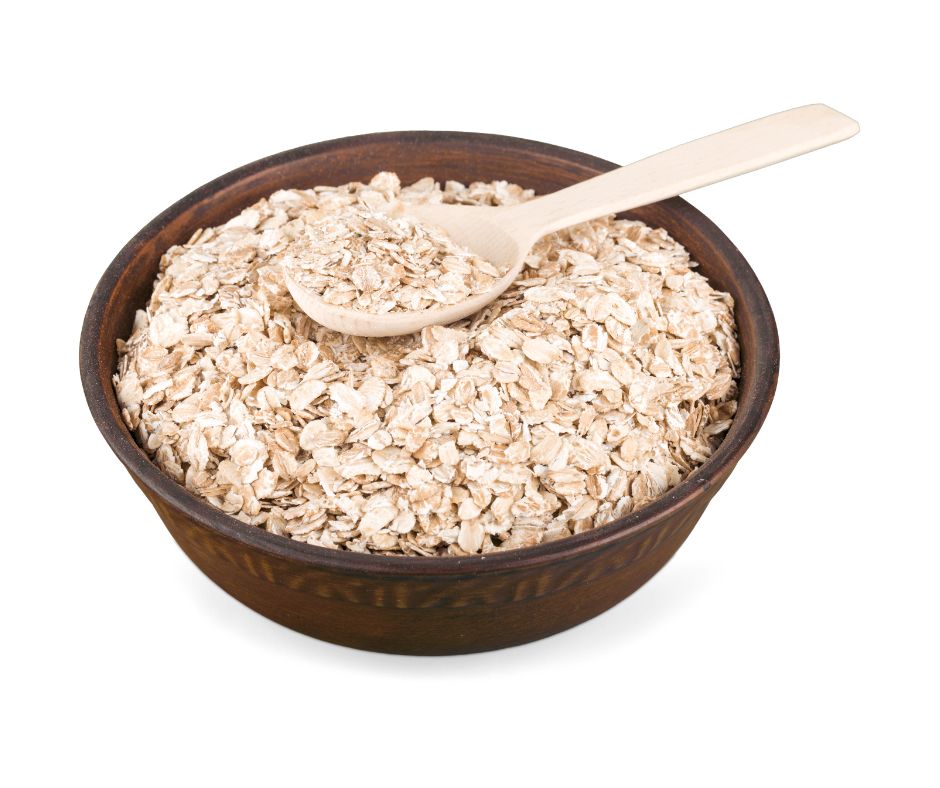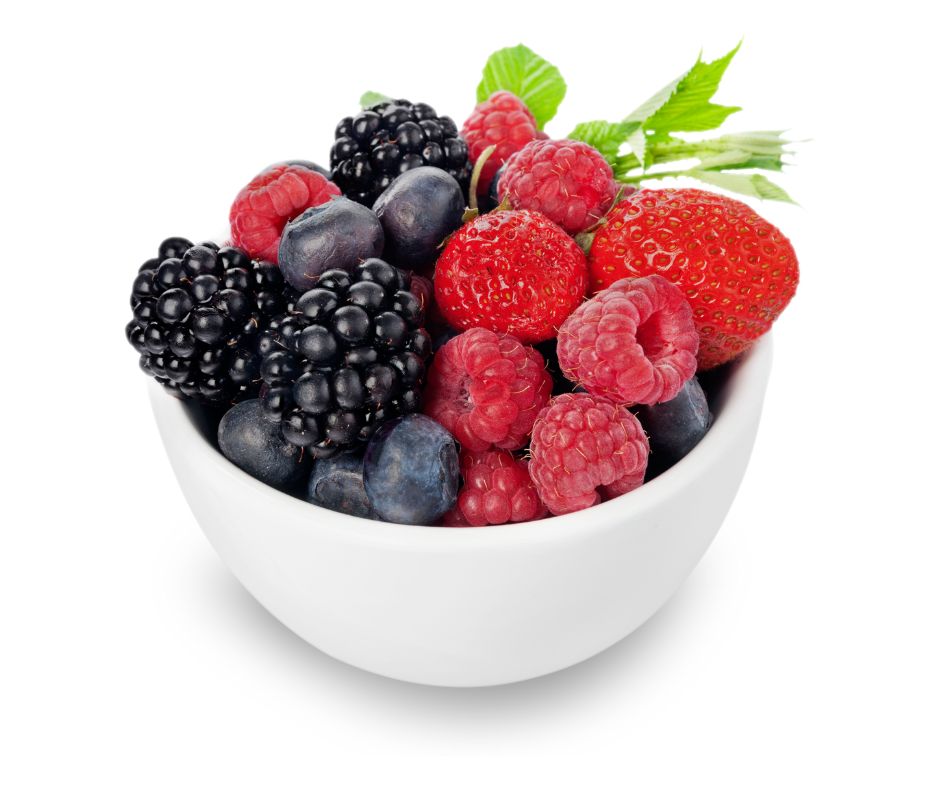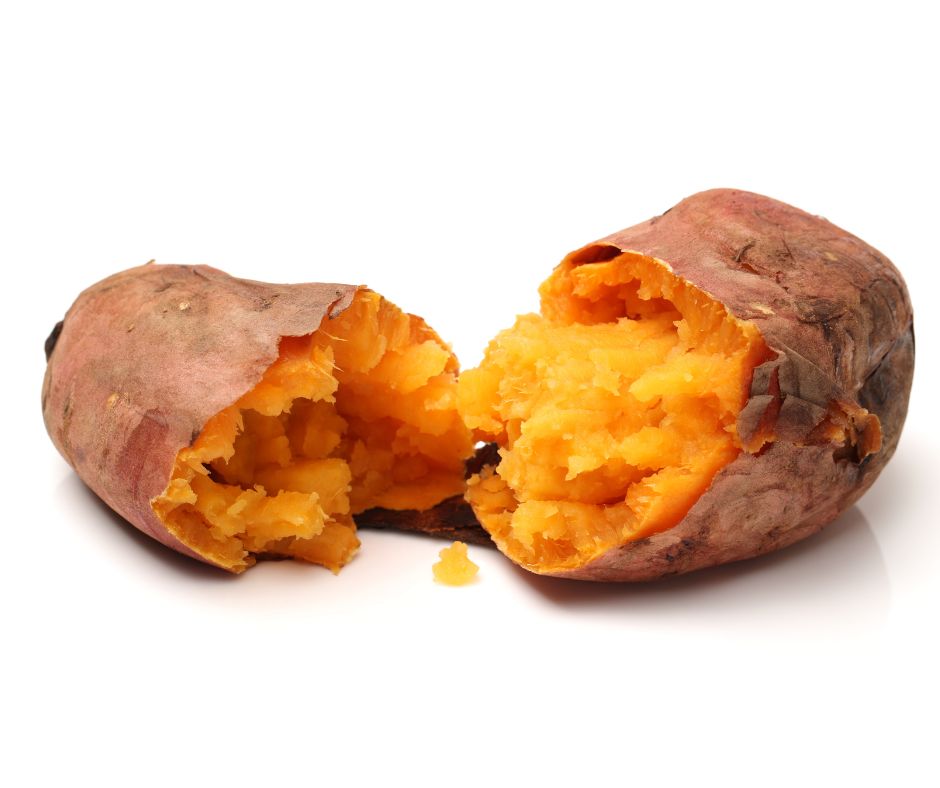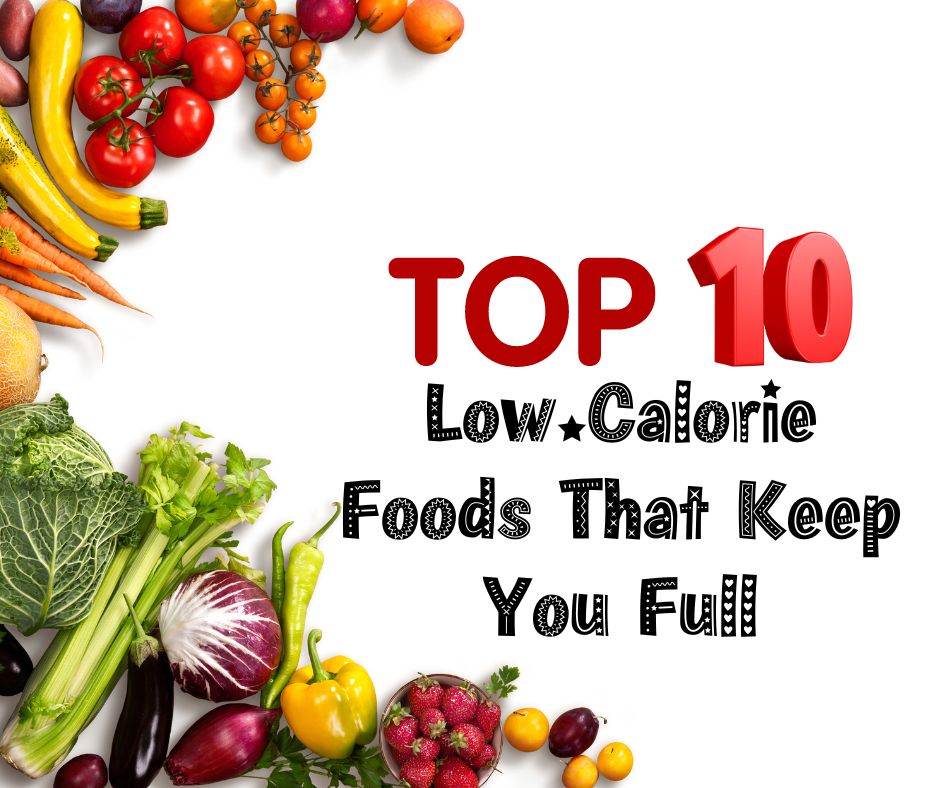Maintaining a healthy weight and a balanced diet can be challenging, especially when it comes to choosing foods that are both low in calories and satisfying. It’s easy to reach for unhealthy snacks when hunger strikes, but they often leave you feeling unsatisfied and craving more. However, there are plenty of delicious, low-calorie foods that can keep you full and satisfied for longer.
In this article, we’ll introduce you to the top 10 low-calorie foods that you can incorporate into your diet to help you feel fuller for longer periods, without sabotaging your weight loss goals.
Oats

Whether you’re looking to shed a few pounds or simply want to make healthier food choices, these foods are sure to keep you satiated and nourished.
Oats are a type of whole grain that is packed with fiber, protein, vitamins, and minerals. They are an ideal low-calorie food that keeps you full and can be incorporated into your diet in various forms.
Here are some key points about the benefits of oats:
- Fiber content: Oats are high in fiber, both soluble and insoluble, which can help reduce hunger and promote feelings of fullness. Soluble fiber forms a gel-like substance in the digestive system, which slows down digestion and keeps you feeling full for longer periods.
- Protein content: Oats are also a good source of plant-based protein, containing approximately 6 grams of protein per 1/2 cup serving. Protein is an essential nutrient that helps build and repair tissues, including muscle tissue.
- Beta-glucan: Oats contain a type of soluble fiber called beta-glucan, which has been shown to reduce appetite and increase feelings of fullness. Beta-glucan can also help lower cholesterol levels and improve heart health.
- Versatility: Oats can be prepared in many ways, such as overnight oats, oatmeal, or granola. They can also be used in baking as a substitute for flour, making them a versatile ingredient for many recipes.
Overall, oats are an excellent low-calorie food that keeps you full and offers a range of health benefits. Whether eaten as a breakfast porridge or added to baked goods, oats are a nutritious and satisfying addition to any diet.
Eggs

Eggs are high protein low carb meals under 300 calories. Also, eggs are nutrient-dense food that can help you feel full and satisfied for a long time. Even so, some famous diets like the military egg diet depend mainly on eating eggs throughout the whole day. They are low in calories and high in protein, making them an ideal low-calorie food that keeps you full. Here are some key points about the benefits of eggs:
- Protein content: Eggs are a great source of protein, with one large egg containing approximately 6 grams of protein. Protein is an essential nutrient that can help increase feelings of fullness and reduce cravings.
- Choline: Eggs are also a good source of choline, an essential nutrient that is important for brain health and development. Choline can also help regulate mood and prevent inflammation.
- Vitamins and minerals: Eggs are a great source of vitamins and minerals, including vitamin D, vitamin B12, and selenium. Vitamin D is important for bone health and immune function, while vitamin B12 is essential for the nervous system. Selenium is an antioxidant that helps protect cells from damage.
- Breakfast option: Eating eggs for breakfast can help reduce calorie intake throughout the day. Studies have shown that people who eat eggs for breakfast consume fewer calories at subsequent meals, leading to weight loss and improved health outcomes.
Overall, eggs are an excellent low-calorie food that keeps you full and provides a range of health benefits. They can be eaten in a variety of ways, such as boiled, fried, or scrambled, making them a versatile ingredient for many recipes.
Check out
Greek Yogurt

Greek yogurt is a delicious and nutritious low-calorie food that keeps you full. It’s made by straining regular yogurt to remove most of the whey, resulting in a thicker and creamier texture. Here are some key points about the benefits of Greek yogurt:
- Protein content: Greek yogurt is a rich source of protein, containing approximately 17 grams of protein in a 6-ounce serving. Protein is an essential nutrient that can help reduce hunger and increase feelings of fullness.
- Probiotics: Greek yogurt contains live and active cultures, also known as probiotics, which can help improve digestive health and boost the immune system.
- Calcium: Greek yogurt is also high in calcium, a mineral that is important for bone health and can help prevent osteoporosis.
- Versatility: Greek yogurt can be used in many ways, such as a base for dips and sauces, a substitute for sour cream, or a topping for fruit and granola. It can also be added to smoothies and baked goods for added protein and creaminess.
- Lower in sugar: Greek yogurt is lower in sugar compared to regular yogurt, making it a better option for those trying to reduce their sugar intake.
Overall, Greek yogurt is a nutritious and filling low-calorie food that offers a range of health benefits. Whether eaten as a snack, used as a substitute ingredient in recipes, or added to smoothies, Greek yogurt is a versatile and delicious addition to any diet.
Check out
Berries

Berries are a group of small, juicy, and colorful fruits that are low in calories and high in nutrients. They are also an excellent low-calorie food that keeps you full. Here are some key points about the benefits of berries:
- High in antioxidants: Berries are rich in antioxidants, which are compounds that can help protect against oxidative stress and inflammation. Some of the antioxidants found in berries include anthocyanins, flavonols, and ellagic acid.
- Fiber content: Berries are high in fiber, which can help promote feelings of fullness and reduce hunger. Fiber also plays a role in digestive health and can help regulate blood sugar levels.
- Low in calories: Berries are low in calories, making them an ideal snack or dessert for those looking to reduce their calorie intake.
- Vitamins and minerals: Berries are a great source of vitamins and minerals, including vitamin C, vitamin K, and potassium. Vitamin C is important for immune function and skin health, while vitamin K is important for bone health. Potassium is essential for heart health and can help lower blood pressure.
- Versatility: Berries can be eaten in many ways, such as fresh, frozen, or dried, and can be added to smoothies, yogurt, oatmeal, or salads. They can also be used in baking for added flavor and nutrition.
Overall, berries are a delicious and nutritious low-calorie food that keeps you full and provides a range of health benefits. Whether eaten as a snack or added to recipes, berries are a versatile and tasty way to boost your nutrient intake and satisfy your hunger.
Legumes

Legumes are a group of plant foods that include beans, lentils, chickpeas, and peas. They are low in fat and high in nutrients, making them an excellent low-calorie food that keeps you full. Here are some key points about the benefits of legumes:
- Protein content: Legumes are a good source of protein, which is essential for building and repairing tissues in the body. They contain approximately 7-9 grams of protein per half-cup serving, making them a great plant-based protein option.
- Fiber content: Legumes are high in fiber, which can help reduce appetite and promote feelings of fullness. Fiber also helps regulate digestion and can lower cholesterol levels.
- Low glycemic index: Legumes have a low glycemic index, meaning they release glucose slowly into the bloodstream and can help regulate blood sugar levels. This can be especially beneficial for those with diabetes or insulin resistance.
- Rich in micronutrients: Legumes are a good source of vitamins and minerals, including iron, magnesium, and folate. Iron is important for healthy red blood cells, magnesium is important for bone health, and folate is important for fetal development during pregnancy.
- Versatility: Legumes can be used in a variety of dishes, including soups, stews, salads, and dips. They can also be used as a meat substitute in vegetarian and vegan recipes.
Overall, legumes are a nutrient-dense and filling low-calorie food that offers a range of health benefits. They are a great addition to any diet and can be used in a variety of dishes to add flavor, texture, and nutrition.
Broccoli

Broccoli is a cruciferous vegetable that is low in calories and high in nutrients, making it an excellent low-calorie food that keeps you full. Here are some key points about the benefits of broccoli:
- Fiber content: Broccoli is high in fiber, which can help promote feelings of fullness and reduce hunger. Fiber also plays a role in digestive health and can help regulate blood sugar levels.
- Vitamin content: Broccoli is a great source of vitamins, including vitamin C, vitamin K, and vitamin A. Vitamin C is important for immune function and skin health, while vitamin K is important for bone health. Vitamin A is important for vision and skin health.
- Mineral content: Broccoli is also a good source of minerals, including calcium, iron, and potassium. Calcium is important for bone health, iron is important for healthy red blood cells, and potassium is important for heart health and can help lower blood pressure.
- Antioxidant content: Broccoli contains antioxidants, such as vitamin C and beta-carotene, that can help protect against oxidative stress and inflammation.
- Versatility: Broccoli can be eaten raw or cooked and can be added to a variety of dishes, including salads, stir-fries, soups, and casseroles. It can also be roasted, grilled, or steamed for a simple and nutritious side dish.
Overall, broccoli is a delicious and nutritious low-calorie food that keeps you full and provides a range of health benefits. Whether eaten raw or cooked, broccoli is a versatile and tasty way to boost your nutrient intake and satisfy your hunger.
Popcorn

The calories in 1 cup of popcorn, oil popped is 85, which makes it a low-calorie high-fiber snack. Here are some key points about the benefits of popcorn:
- Fiber content: Popcorn is a good source of dietary fiber, which can help promote feelings of fullness and reduce appetite. Fiber also plays a role in digestive health and can help regulate blood sugar levels.
- Whole grain content: Popcorn is a whole grain, meaning it contains all parts of the grain, including the bran, germ, and endosperm. This makes it a nutrient-dense snack that provides a range of vitamins, minerals, and antioxidants.
- Low-calorie content: Air-popped popcorn is a low-calorie snack that can help satisfy your hunger without adding excessive calories to your diet. One cup of air-popped popcorn contains just 30 calories.
- You can decrease its fat content: Popcorn can be a healthy snack option without excessive butter, oil, or salt. You can add flavor to popcorn with spices, such as chili powder, garlic powder, or cinnamon, or by using a sprinkle of nutritional yeast or grated Parmesan cheese.
Overall, popcorn is a delicious and nutritious low-calorie food that keeps you full and provides a range of health benefits. Whether enjoyed as a snack or as part of a meal, popcorn is a versatile and satisfying way to boost your nutrient intake and keep hunger at bay.
Apples

Apples are versatile and delicious fruits that are low in calories and high in fiber, making them an excellent low-calorie food that keeps you full. Here are some key points about the benefits of apples:
- Fiber content: Apples are a good source of dietary fiber, including both soluble and insoluble fiber, which can help promote feelings of fullness and reduce appetite. Soluble fiber can also help lower cholesterol levels and improve blood sugar control.
- Nutrient content: Apples are a good source of a variety of vitamins and minerals, including vitamin C, vitamin K, and potassium. Vitamin C is important for immune function and skin health, while vitamin K is important for bone health. Potassium is important for heart health and can help lower blood pressure.
- Antioxidant content: Apples are rich in antioxidants, such as flavonoids and polyphenols, which can help protect against oxidative stress and inflammation. These antioxidants may also help reduce the risk of chronic diseases, such as heart disease and cancer.
- Variety: Apples come in a variety of colors and flavors, making them a versatile and tasty addition to any diet. They can be eaten raw as a snack, added to salads or oatmeal for breakfast, or used in baking or cooking.
- Convenience: Apples are a convenient and portable snack that can be easily carried with you on the go. They can help satisfy hunger cravings between meals and provide a quick and healthy energy boost.
Overall, apples are a delicious and nutritious low-calorie food that keeps you full and provides a range of health benefits. Whether eaten raw or cooked, apples are a versatile and satisfying way to boost your nutrient intake and keep hunger at bay.
Sweet potato

Sweet potatoes are a tasty and nutritious root vegetable that is low in calories and high in fiber, making them an excellent low-calorie food that keeps you full. Here are some key points about the benefits of sweet potatoes:
- Fiber content: Sweet potatoes are a good source of dietary fiber, which can help promote feelings of fullness and reduce appetite. Fiber also plays a role in digestive health and can help regulate blood sugar levels.
- Nutrient content: Sweet potatoes are rich in a variety of vitamins and minerals, including vitamin A, vitamin C, and potassium. Vitamin A is important for immune function and vision health, while vitamin C is important for skin health and immune function. Potassium is important for heart health and can help lower blood pressure.
- Antioxidant content: Sweet potatoes are rich in antioxidants, such as beta-carotene, which can help protect against oxidative stress and inflammation. Beta-carotene is also converted into vitamin A in the body.
- Slow-burning carbohydrates: Sweet potatoes are a good source of complex carbohydrates, which are slowly digested and provide a steady source of energy. This can help prevent energy crashes and reduce cravings for unhealthy snacks.
- Versatility: Sweet potatoes can be prepared in a variety of ways, including baked, roasted, mashed, or grilled. They can be seasoned with a range of spices, such as cinnamon, paprika, or cumin, and used in both sweet and savory dishes.
Overall, sweet potatoes are a delicious and nutritious low-calorie food that keeps you full and provides a range of health benefits. Whether enjoyed as a side dish or as the main course, sweet potatoes are a versatile and satisfying way to boost your nutrient intake and keep hunger at bay.
Chicken breasts

Chicken breasts are lean and protein-packed meat that is low in calories and high in nutrients, making them an excellent low-calorie food that keeps you full. Here are some key points about the benefits of chicken breasts:
- Protein content: Chicken breasts are an excellent source of high-quality protein, which is important for muscle growth and repair. Protein also plays a role in satiety and can help reduce appetite.
- Nutrient content: Chicken breasts are a good source of a variety of vitamins and minerals, including vitamin B6, vitamin B12, and selenium. Vitamin B6 and B12 are important for brain function and energy metabolism, while selenium is important for immune function and thyroid health.
- Low in fat: Chicken breasts are lean meat that is low in saturated fat and cholesterol. This makes them heart-healthy and can help reduce the risk of chronic diseases, such as heart disease and diabetes.
- Versatility: Chicken breasts can be prepared in various ways, such as grilled, baked, or sautéed. They can be seasoned with a range of herbs and spices, such as rosemary, thyme, or paprika, and used in a variety of dishes, from salads to stir-fries.
- Convenience: Chicken breasts are a convenient and versatile ingredient that can be easily added to meals for a protein boost. They can be cooked in large batches and used throughout the week in a variety of dishes.
Overall, chicken breasts are a delicious and nutritious low-calorie food that keeps you full and provides a range of health benefits. Whether enjoyed as a main course or added to salads or stir-fries, chicken breasts are a versatile and satisfying way to boost your nutrient intake and keep hunger at bay.
Conclusion
In conclusion, incorporating these top 10 low-calorie foods into your diet can help you feel full while keeping your calorie intake low. They are all nutrient-dense foods that are high in fiber and protein, making them an ideal addition to any weight loss or healthy eating plan. Whether you’re looking for a snack or a meal, these foods are sure to keep you satisfied and nourished.
